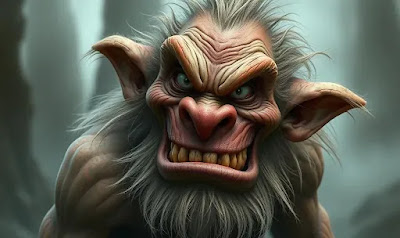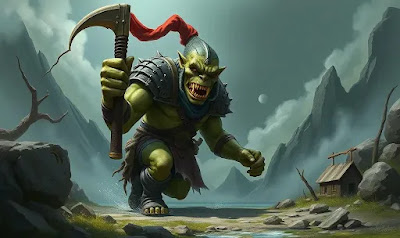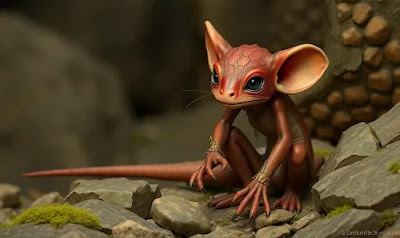Creator of Yoon-Suin and other materials. Propounding my half-baked ideas on role playing games. Jotting down and elaborating on ideas for campaigns, missions and adventures. Talking about general industry-related matters. Putting a new twist on gaming.
Monday, 30 December 2024
2024 in Review
Monday, 23 December 2024
The Fiction Becomes the System for Advancement; Or, Something Needs to be Heavy
In the comments on a recent entry, the subject of rules-lite games and level advancement came up. It has always been my position that problems with rules-lite games arise when they become so rules-lite that they lack sufficient 'crunch' to be used in for a long-term, open-ended campaign. A long-term campaign needs advancement to give impetus to proceedings, and this is harder to achieve in direct proportion to how ephemeral the rules feel. The good thing about advancement in D&D, for instance, is that by going up in levels new possibilities are opened by virtue of the fact that the system incorporates many options and add-ons - there are new spells to learn, new magic items to find, new abilities to develop (depending on one's edition of choice). This is harder to achieve with a rules-lite system where all one really gets to do is fiddle around with a very limited number of stats or abilities.
However, I am persuaded, as commenter diessa puts it in the post in question, there is a case to be made that one can - if only one is of a mind to - run a rules-lite campaign in which 'the fiction becomes the system for advancement'. The idea here is that the PCs have goals that are intrinsic to the 'fiction' itself rather than extrinsic ones to do with improving stats, hit points or whatever - solving murders, say, or social advancement, or earning lots of money, or realising some project or objective. And here it wouldn't matter that the rules are 'lite', so to speak, because they would only exist in order to provide a basic framework in which 'the fiction' can evolve.
I can buy this to a certain extent, but I think it misses something important, which is that in order to get to a point at which 'the fiction becomes the system for advancement', there still needs to be part of the campaign that is heavy in the sense of requiring lots of careful thought and probably a great deal of procedural moving parts (but which might be hidden from the players themselves). For instance, I can easily imagine a long-running campaign with a rules-lite system being successful if it chiefly involved investigation - a crime procedural, for instance, or an Unknown Armies or Call of Cthulhu-style paranormal mystery. But I can't really imagine either of those things working without the DM having to invest a lot of time in figuring out ways to systematise the distribution of clues, connections between NPCs, random events, flowcharts dictating what happens if the PCs do X and then Z rather than Y, and so on and so forth; there will still have to be weight, in this sense, but placed behind the scenes rather than being foregrounded in the player-facing rules.
Similarly, I can imagine a long-running campaign with a rules-lite system working if the PCs were, let's say, merchants or traders or businessmen or whatever. But, again, I can't really imagine it working without considerable weight being placed within the commercial or financial aspects of the game - without, say, a way of figuring out what is profitable, in what context, and where.
In short, the argument that I think I am making is that in order for a long-running, open-ended campaign to be a success there is a requirement, even in the context of the rules as such being 'lite', for there to be an aspect of play which is heavy. There has to be something that has sufficient heft to bear the load of sufficient interest and intrigue in order to keep the campaign above water. I am not convinced that it is possible to sustain long-term gaming with mere 'fictional advancement' alone.
Thursday, 19 December 2024
My Shoe is Safe
Yesterday's quiz was a toughie. In it, to recap, commenters were encouraged to guess at what the following pieces of art, generated by Substack's own AI image generator, represented. Here, to begin with, are the answers:
1. Minotaur
2. Troll
3. Orc
Tuesday, 17 December 2024
Satan Illustrated My Bestiary
I have spilt rather a lot of ink dealing with the subject of AI art. (Rather too much perhaps - see previous posts here, here, here, here, here, and here.)
Today I spent an idle moment nibbling at the forbidden fruit by typing some famous monster names into Substack's particular AI image generator. This was based on the theory that if you want to make some pictures of monsters, Satan is probably the ideal artist.
I had originally planned to write an extensive post on this subject, but rapidly discovered a fun way to run a quiz instead. So here goes. Below, I will post a series of numbered pictures as illustrated by Satan. Your job, in the comments, is to guess what they represent. Some are easy! Some are hard! Give it a go. The winner receives unending adulation and glory. The losers - level drain and half hp. Answers to be revealed on Friday.
First, though, I must share with you the great hilarity that ensued when I typed in the words 'Keir Starmer':
I don't know who that man is, but I can tell you that Kier Starmer very much wishes he looked like him. Who the hell is the guy lurking next to him, though?
Anyway, I digress. Here are the monsters. To repeat, put your guesses for each in the comments.
1.
2.
3.
Friday, 13 December 2024
What I Would Do If I Owned D&D
Since in my previous post I raised the question, it is only fair that I deliver my own thoughts on the important matter of what I would do if I owned D&D.
I find myself genuinely split. On the one hand, I think D&D occupies an important role as a sort of universal language, and that its middle-of-the-roadness and basic banality, as a Tolkienesque fantasy RPG denuded of all the things that made Tolkien interesting and worthwhile, is in its own way useful. There is a reason why McDonald's, M&S, Next, Disney princesses, Bond films, etc., exist - it is to provide an easy solution to the question of 'What shall we eat/wear/watch tonight?' The more eccentric and distinctive something is, the harder it will be to get buy-in from those who do not share the eccentricity in question.
Hence, 'blandified, bowdlerized Tolkien with some bits and pieces stolen from pulp fantasy' is much more likely to appeal to a group of five random gamers who want to put a campaign together than is 'Egyptian/meosamerican style megadungeon inside a crocodile's brain' - while one or even two of the group will love the latter idea, the rest will be put off by it, whereas there is a good chance that all five will at least tolerate the former.
There is therefore a space for doing blandified, bowdlerized Tolkien well, and in this respect I suppose it's actually quite difficult to improve on what WotC are already doing. They serve up RPG Big Macs and they do it in such a way as to satisfy the widest range of potential gamers they possibly can. It is not to my taste, but even I eat Big Macs sometimes when it's the easiest and most readily available thing on offer. So the very shot answer to what I would do if I owned D&D could be very straightforward: do what WotC currently do but a bit better. (Chiefly, I would change the art direction so as to be much more John Howe-style understated grandeur, and much less modern-video-game-illustration blandness.)
That's a boring answer, though, and also doesn't really reflect the basic setup of the thought experiment, which is that I am supposed to be imaginging myself as possessing vast wealth and not particularly having any interest in turning a profit. Once you put things that way, all the bets are off and you can start entirely from scratch.
So I am strongly tempted, then, to say that if I owned D&D I would go in the opposite direction - I would be a fantasy maximalist. I would have a set of relatively simple core mechanics and I would commission a range of writers and artists to produce a properly compelling mixture of genuinely novel and fresh settings, and I would foreground procedural generation through random tables throughout. I would put the emphasis entirely on dungeoneering and sandbox exploration, and would eschew 'character' as a central element of play. And while I would not by any means cut down on things like bestiaries and spell lists, I would emphasise the toolkit element of the rules - I would make it very plain that the rules are there to facilitate DMs doing their own imaginative things (inventing monsters, spells, etc.) easily and quickly.
But now that I re-read that paragraph I increasingly wonder whether I am not simply saying in the end that I would cannibalise existing D&D with an OSR mentality (since the OSR basically did all of the things I suggest) and, indeed, perhaps just in the end institutionalise and mainstream what the OSR was all about. This might not be as popular as D&D is now, but it would I think be better, and that's what counts.
Monday, 9 December 2024
What Would You Do If You Owned D&D?
What would you do if you owned D&D?
I ask because the question has taken on a very small amount of pertinence in the last couple of weeks, in the aftermath of Elon Musk's having expressed his views about the game. I don't wish to get into the ins and outs of those views here and I would like to leave politics entirely to one side. I would just like to raise for observation the interesting point that we now live in an age in which there are lots of very nerdy people who also have veritable bag of holding of billions of dollars in cash - and, that since nerds are much more likely to play D&D than the average person, this makes the purchase of D&D by an eccentric billionaire are not-entirely unthinkable proposition.
Reel off the list: Elon Musk. Bill Gates. Mark Zuckerberg. Peter Thiel. Sundar Pichai. Sam Altman. And so on and so on; the question that is most appropriate to ask is not 'How many of these people have played D&D?' but 'How many of them haven't?' And who is to write off the possibility that one of these people may some day decide that they would actually quite like to be the one who gets to make his favourite role playing game his plaything? The thing about eccentric billionaires is that they do eccentric things with their money. Could we see emerging a future in which D&D, in the manner of a down-at-heel sport club bought by Hollywood Stars, becomes a trophy of of the super-rich?
Elon Musk himself was openly musing in the aftermath of the recent farrago (one assumes jokingly, though possibly not) about buying Hasbro, whose market capitalisation is 'only' about $9 billion. What would you do vis-a-vis D&D if you had just bought Hasbro for $9 billion? Or, for that matter, if you had just prized the D&D IP from Wizards of the Coast, presumably for rather less than $9 billion, and made it your own?
To keep this organised and manageable, I recommend limiting yourself to decisions across up to three axes.
1 - What would you do with respect to the rules?
2 - What changes would you make to the default setting?
3 - What settings would you commission? Bear in mind you are an eccentric multi-billionaire. Probably any book or film franchise is achievable. Which would you pick?
Tuesday, 3 December 2024
Twelve Module Ideas
Apropos of nothing, here are 12 ideas for modules with one-sentence descriptors. If you like this post, write your own variant.
1. The Tophet of the Giants. A cemetery of tombs for the sacrificed children of an ancient race of giants.
2. The Golem Foundry. A huge underground complex where metal is melted and cast for the creation of different types (copper, iron, gold, etc.) of golem; each step in the process takes place in a different network of chambers, performed by a different type of servitor.
3. The Roc's Nest. A gargantuan bundle of tree trunks and boulders moulded together by a titanic bird; within are giant fleas, ticks and other parasites; insects of any and all different kinds; scavengers and raiders living off leftovers; and the occasional treasure dropped by a victim before being devoured.
4. The Palace of Death. A place where the nobility of a long-lost civilisation would go to be euthanised in various inventive, beautiful, spectacular and horrifying ways; their ghosts haunt the labyrinthine corridors.
5. The Lost World. A tepui on top of which is a remnant of an ancient civilisation or race of monsters.
6. The Leviathans' Graveyard. A remote shore where gargantuan whales go to die; their huge corpses litter the coast, providing shelter to may different inhabitants.
7. The Old Forest. A copse of trees which, when entered, is of vastly greater size than it first appears.
8. The Floating Mass. A huge natural raft of vegetation which has arrive on a coastline, bringing with it strange beings from a distant land.
9. The Temple that Fell Down the Mountain. A high mountaintop temple, long inaccessible to ordinary mortals, has fallen in a landslide, its ancient treasures scattered across the mountainside.
10. The City Descended. A famous floating sky-city has made a hitherto-unprecedented 'landing' due to some emergency or overriding imperative; something has happened to the inhabitants.
11. The Oubliette Unlocked. A great subterranean prison into which an ancient race flung their outcasts and exiles, now rediscovered by miners and accidentally opened.
12. The City of the Mist. A city, long ago cursed to remain permanently shrouded in fog, has had its curse miraculously lifted after centuries - to reveal a place very different to what what was there before.

















